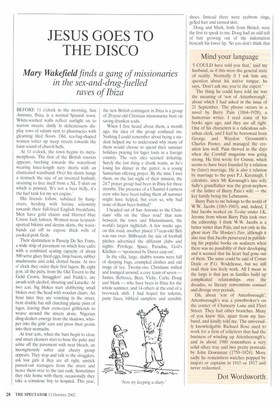Mind your language
'I COULD have told you that,' said my husband, as if this were the general state of reality. Normally if I ask him any question about his native tongue, he says, 'Don't ask me, you're the expert.'
The thing he could have told me was the meaning of 'son of Attenborough', about which I had asked in the issue of 21 September. The phrase occurs in a novel by Barry Pain (1864-1928), a humorous writer. I read some of his books ages ago, and they are all right. One of his characters is a ridiculous suburban clerk, and I feel he borrowed from George and Weedon Grossmith's Charles Pooter, and managed the creation less well. Pain thrived in the days when the Comhill magazine was going strong. He first wrote for Granta, which seems to have been founded by a relation by (later) marriage. He is also a relation by marriage to the poet P.J. Kavanagh, I calculate, since Mr Kavanagh's late wife Sally's grandfather was the great-nephew of the father of Barry Pain's wife — the key family being the Lehmanns.
Barry Pain to me belongs to the world of W.W. Jacobs (1863-1943), and, indeed, I find Jacobs worked on To-day under J.K. Jerome from whom Barry Pain took over the editorship. I think W.W. Jacobs is a better writer than Pain, and not only in the ghost story The Monkey's Paw, although it also true that Jacobs persevered in publishing his popular books on seafarers when there was no possibility of their developing and it seemed that his heart had gone out of them. The same could be said of Conan Doyle or P.G. Wodehouse, but we still read their less lively work. All I mean in the large is that just as families build up complicated relationships over the decades, so literary conventions connect and diverge over periods.
Oh, about 'son of Attenborough': Attenborough's was a pawnbroker's on the corner of Chancery Lane and Fleet Street. They had other branches. Many of you knew this, apart from my husband, and kindly told me. The universally knowledgable Richard Rose used to work for a firm of solicitors that had the business of winding up Attenborough's, and in about 1980 remembers a very solid silver tray and two pretty portraits by John Downman (1750-1824). More sadly he remembers watches popped by majors or captains in 1915 or 1917 and never redeemed.
Dot Wordsworth Dot Wordsworth


































































































 Previous page
Previous page